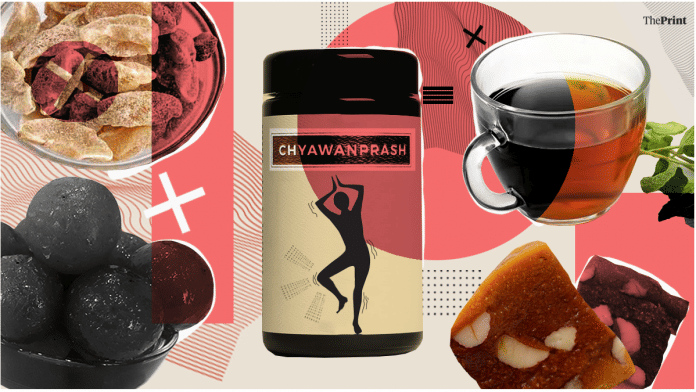New Delhi: Murabba, herbal tea, badam pak, amla candies, chyawanprash and other such popular ayurvedic products will soon be examined by the Narendra Modi government to check their quality and verify their health benefit claims, ThePrint has learnt.
The government will roll out regulations to check these food products sold across the country with “therapeutic claims”. The regulations will include taking approvals for products, audits of manufacturing units and complying with all the set standards.
Ayurvedic food products are those that contain herbs or plants that are mentioned in ayurvedic textbooks for various health benefits.
Murabba, herbal tea, badam pak, amla candies and chyawanprash do not fall under the purview of the Food Safety and Standards Authority of India (FSSAI), the country’s food regulator, and, therefore, it can’t check these products.
Considering the increased awareness of health and wellness — driven by a rise in non-communicable diseases — the demand for ayurvedic products has increased in India, but a large part of this market is unregulated.
According to a report by Confederation of Indian Industry (CII) and PricewaterhouseCoopers (PwC) released in 2018, 77 per cent of Indian households used ayurvedic products in 2017 — up from 69 per cent in 2015.
A senior official of the Ministry of AYUSH said a set of regulations has been drafted under its programme “Ayurveda Aahar” in collaboration with the FSSAI to regulate the market of ayurvedic products.
“The draft has been sent to stakeholders for final comments and the final notification is likely to be rolled out by February 2020,” the official told ThePrint.
“All ayurvedic food products, which claims therapeutic values, will come under these regulations. Until now, the market is completely unregulated and their claims go unchecked,” he added.
The regulations will allow FSSAI to check the claims made by these products apart from setting the standards for “Ayurvedic Aahar”, which the ministry wants as a separate category.
Some products — such as oats and ragi biscuits that are presently regulated by FSSAI — may also move under the new regulations as oats and ragi are prescribed to treat a variety of conditions such as diabetes, obesity and cardiovascular diseases.
Also read: Haldiram, Patanjali, McDonald’s, PepsiCo selling food with high sodium, fat levels: Study
‘Ayurveda books to be referred to food manufacturers’
The FSSAI, in 2018, had released comprehensive regulations that prescribe standards for food and health supplements, nutraceuticals, foods for special dietary uses and special medical purposes, and functional and novel foods, but not for ayurvedic products.
“Ayurvedic food will become a separate category for food regulation under FSSAI. Also, schedule IV of FSSAI’s regulation specifies the permitted levels of plant or botanical ingredients in supplements and nutraceutical products,” the ministry official quoted above said.
Under the separate category, the standards for ingredients, as well as recipes, will be defined. “For instance, how murabba of gooseberries should be made according to ayurveda textbooks,” the official added.
A list of books will also be finalised to refer them to product manufacturers.
“The regulatory framework and implementation methodology will be provided and a logo will be launched too,” an FSSAI official told ThePrint.
Setting food standards will help India’s food market
The market for ayurvedic products is not just growing domestically. The size of the global ayurvedic market is expected to almost treble to $9.7 billion by 2022 from $3.4 billion in 2015, according to the CII-PwC report.
The report emphasised the need for standardisation and quality control to launch ayurveda on a global scale.
According to a 5-year vision document of the AYUSH ministry, setting food standards will help India emerge as a prominent food market for quality products in nutraceutical and ayurveda segments.
“The move will help India attract private investments from established food brands (domestic and foreign) and also improve the MSME economy and women self-help groups, which are majorly involved in ayurveda food-making industry,” the AYUSH ministry official said.
This article has been updated to reflect accurately one aspect of the CII-PwC report — in 2017, 77% of Indian households consumed ayurvedic products, not chyawanprash alone.
Also read: Beef burgers are problematic, not just for your health but also the climate







Excellent